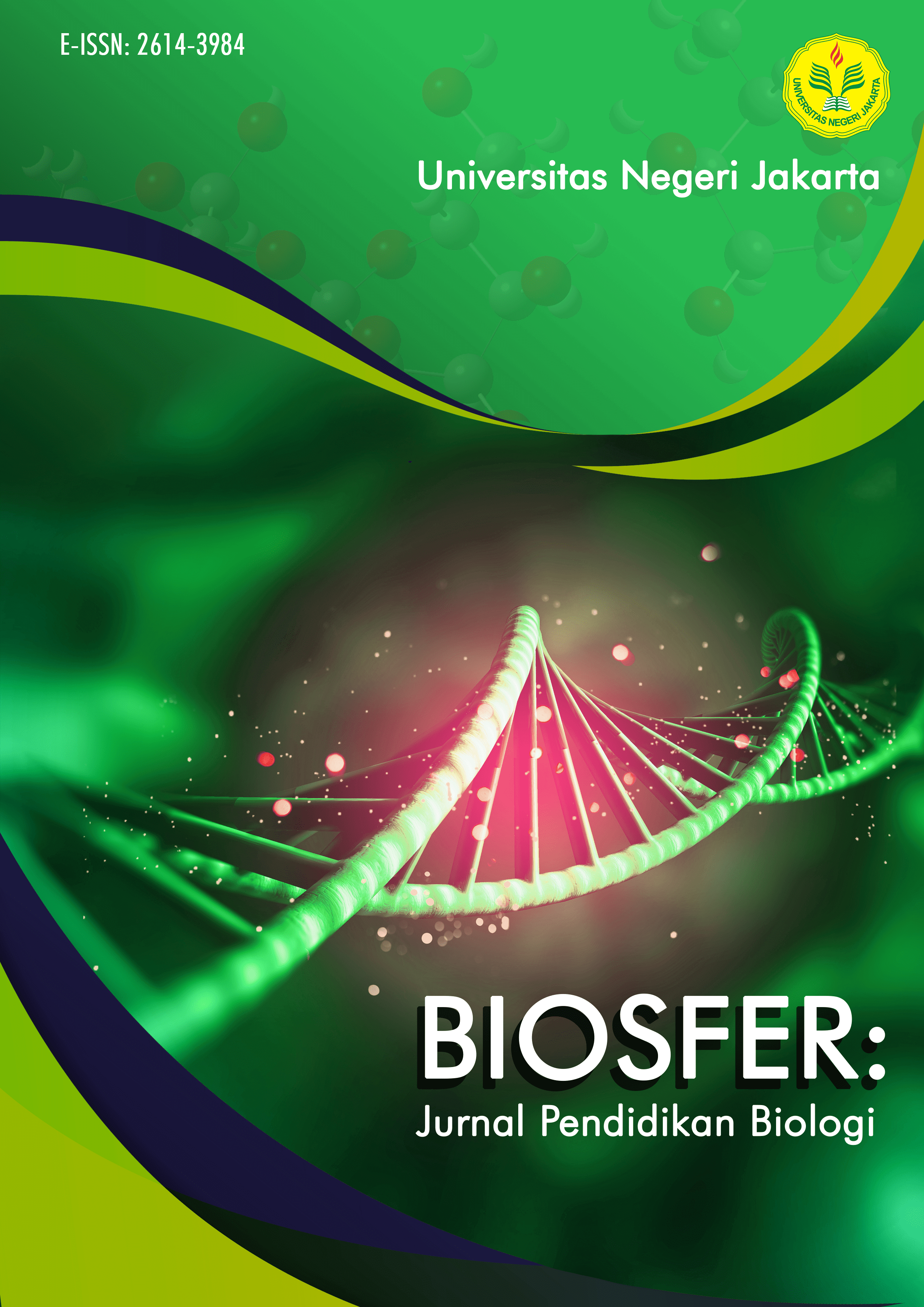Designing a module for learning plant biodiversity: An effort for conservation of local wisdom
DOI:
https://doi.org/10.21009/biosferjpb.22663Keywords:
Conservation, Contextual Learning, Local Wisdom, Plant BiodiversityAbstract
This research aims to develop a module based on plant biodiversity and conservation in the Kudus area for high school students. The R&D research design, according to Borg & Gall, was implemented. The module was developed in five stages: research and information-gathering, planning; initial product development; preliminary field test; and product revision. Assessment and review of the module were performed by seven expert validators. Validity and reliability of the assessment instrument for the module were conducted and participated by 68 students. Thirty-one students became participants in the field test. Data were collected using a validation sheet and questionnaire. Data Analysis utilized excel, SPSS, and Rasch. Based on the assessment of validator experts, the module was declared valid. The module validation test gained an average score of 3.68 (very good). Students' responses showed that the Person measure was +3.22 logit, indicating that the students tended to agree with the proposed questions. The person and item reliability were 0.84 and 0.77, respectively. These values mean that the person reliability showed high consistency. The result of Rasch Analysis clarified the acceptance of students regarding the module both from Kudus and Non Kudus area. The results also showed students' interest and understanding of the issue of conservation and biodiversity, as well as their awareness of the local wisdom. It is recommended to develop a similar module as an effort of local potencies conservation.
References
Assapari, M. M. (2014). Eksistensi bahasa Indonesia sebagai bahasa nasional dan perkembangannya di era globalisasi. Prasi, 9(18): 29—37. doi: http://dx.doi.org/10.23887/prasi.v9i18.8943.
Aziz, A. L. (2014). Penguatan identitas bahasa Indonesia sebagai lambang identitas nasional dan bahasa persatuan jelang penerapan Masyarakat Ekonomi ASEAN (MEA) 2015. Jurnal Studi Sosial, 6(1): 14—20.
Kridalaksana, H. (2011). Kamus Linguistik Edisi Keempat. Jakarta: Gramedia Pustaka Utama.
Mahsun (2019). Metode Penelitian Bahasa: Tahapan, Strategi, Metode, dan Tekniknya Edisi Ketiga. Depok: Rajawali Pers.
Mulyana, A. T. (2018). Isu-isu kritis kebijakan bahasa dan pengajaran bahasa. Biormatika: Jurnal Ilmiah Fakultas Keguruan dan Ilmu Pendidikan, 4(01): 1—7.
Rahayu, A. P. (2015). Menumbuhkan bahasa Indonesia yang baik dan benar dalam pendidikan dan pengajaran. Jurnal Paradigma, 2(1): 1—15.
Sartini, N. W. (2014). Revitalisasi bahasa Indonesia dalam konteks kebahasaan. Masyarakat, Kebudayaan, dan Politik, 27(4): 206—210. doi: http://dx.doi.org/10.20473/mkp.V27I42014.206-210.
Sihombing, R., Wisnaeni, F., & Saraswati, R. (2017). Indonesia Nomor 24 Tahun 209 tentang Bendera, Bahasa, dan Lambang Negara, serta Lagu Kebangsaan (Studi penggunaan bahasa Indonesia di bangunan gedung fungsi usaha yang ada di Kota Semarang). Diponegoro Law Journal, 6(2): 1—10.
Sudaryanto, S., Soeparno, S., & Ferawati, L. (2019a). Politics of language in Indonesia: Study of history and langugae policy. Aksis: Jurnal Pendidikan Bahasa dan Sastra Indonesia, 3(1): 129—139. doi: https://doi.org/10.21009/AKSIS.030113.
Sudaryanto, S., Lestari, A. T., & Anggita, F. D. (2019b). Pembinaan bahasa Indonesia: Bagaimana strateginya di era digital? Jurnalistrendi: Jurnal Linguistik, Sastra, dan Pendidikan, 4(1): 269—278.
Sudaryanto, S., Hermanto, H., & Gustiani, E. I. (2019c). Media sosial sebagai sarana pembinaan bahasa Indonesia di era digital. Kode: Jurnal Bahasa, 8(4): 61—74. doi: https://doi.org/10.24114/kjb.v8i4.16005.
Sudrama, K. & Yadnya, I. B. P. (2017). Dilema multilingualisme dan implikasinya terhadap perencanaan bahasa. Retorika: Jurnal Ilmu Bahasa, 1(1): 94—107. doi: https://doi.org/10.22225/jr.1.1.15.94-107.
Wijana, I. D. P. (2018). Pemertahanan dan pengembangan bahasa Indonesia. Widyaparwa, 46(1): 91—98. Doi: https://doi.org/10.26499/wdprw.v46i1.166.
Downloads
Published
How to Cite
Issue
Section
License
The Authors submitting a manuscript do so on the understanding that if accepted for publication, copyright of the article shall be assigned to Biosfer: Jurnal Pendidikan Biologi (Biosferjpb) and Departement of Biology Education, Universitas Negeri Jakarta as publisher of the journal.



